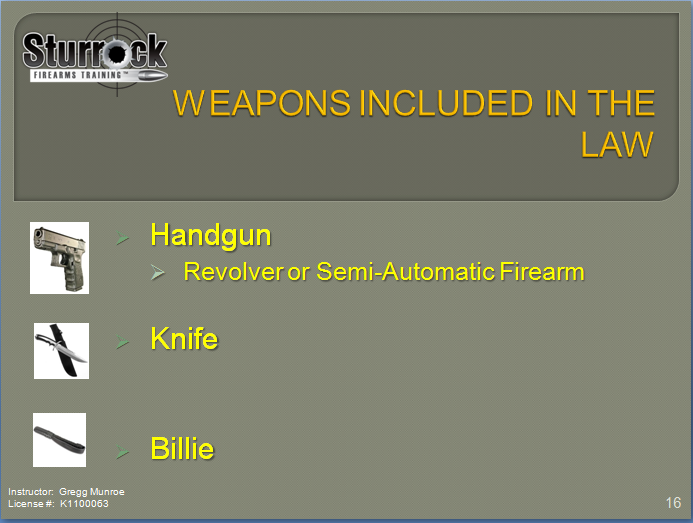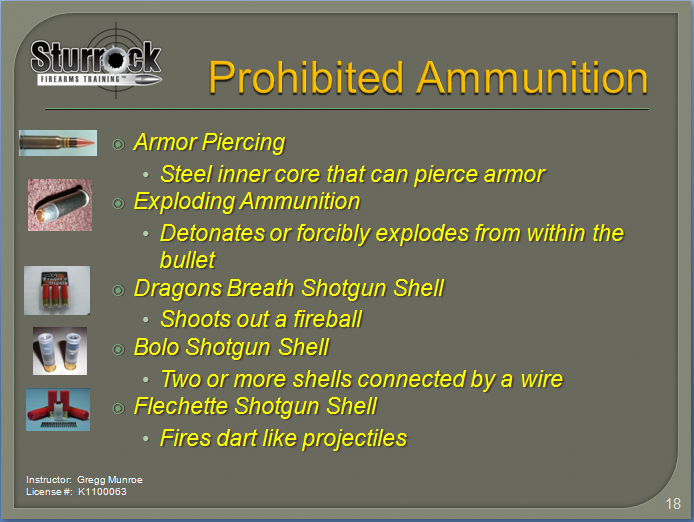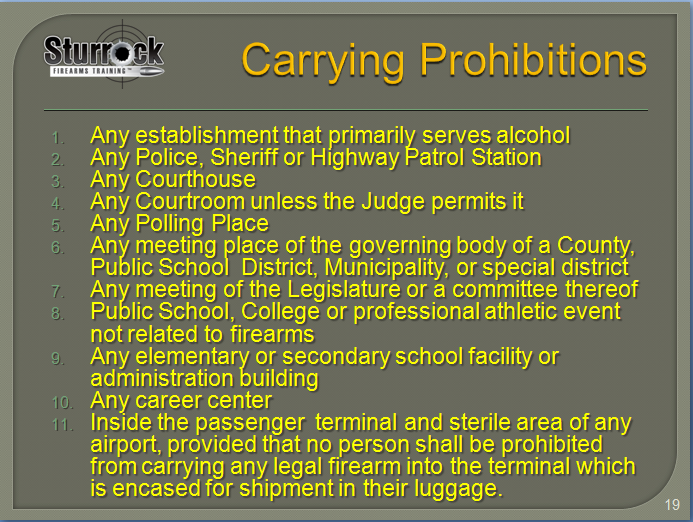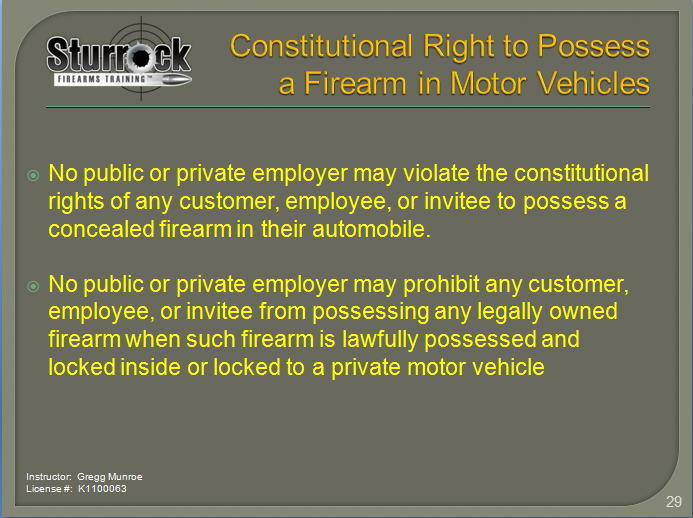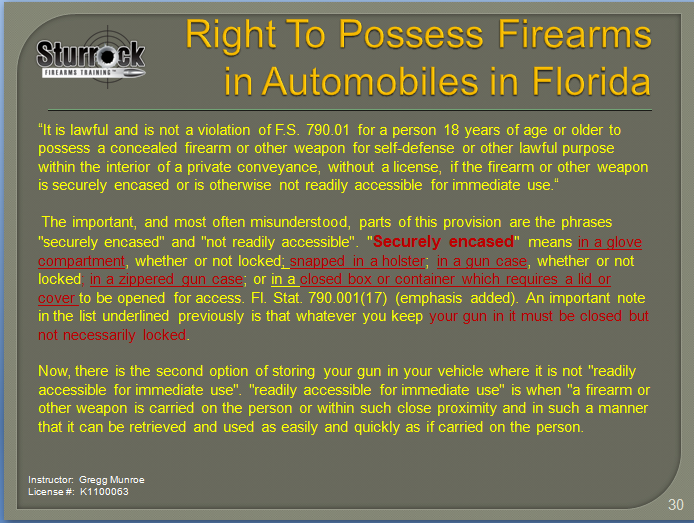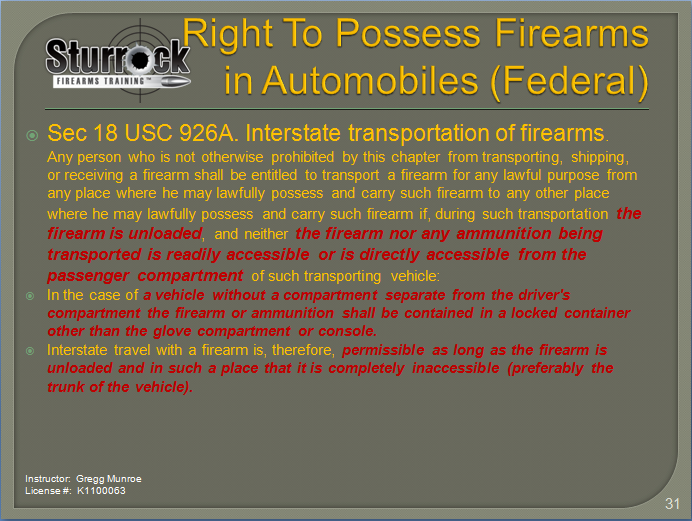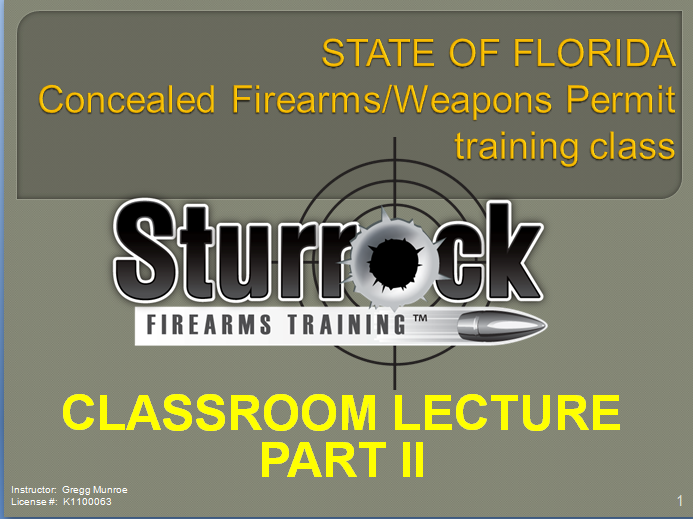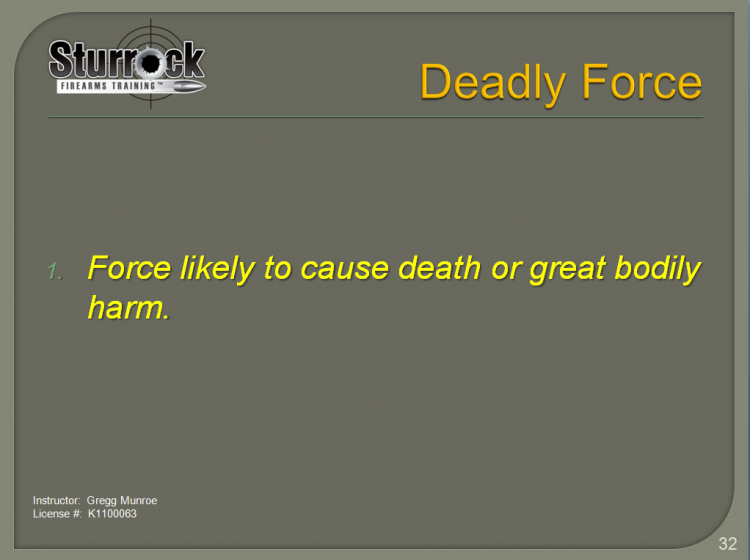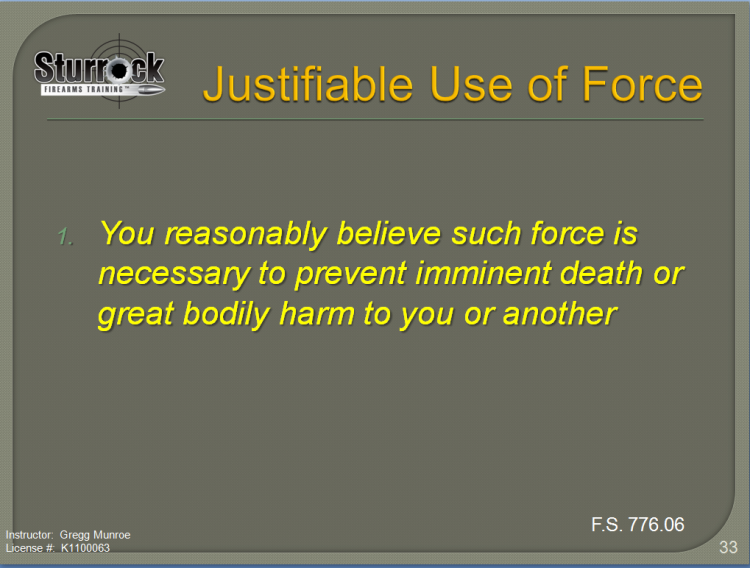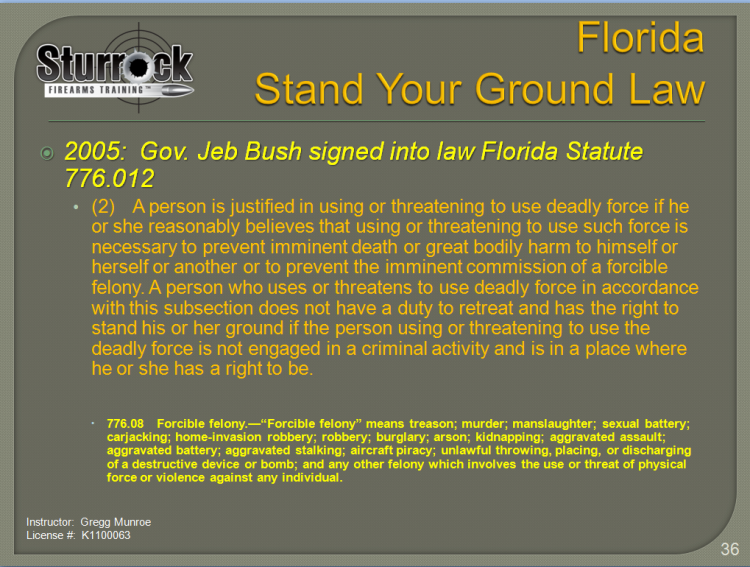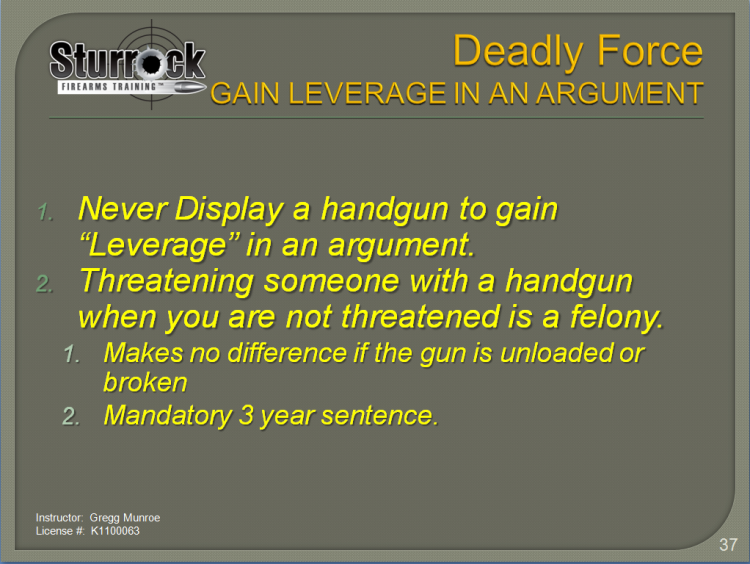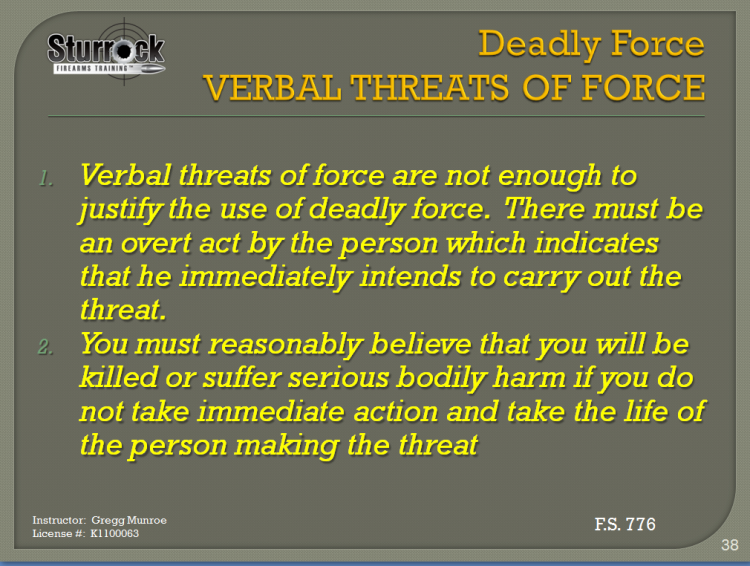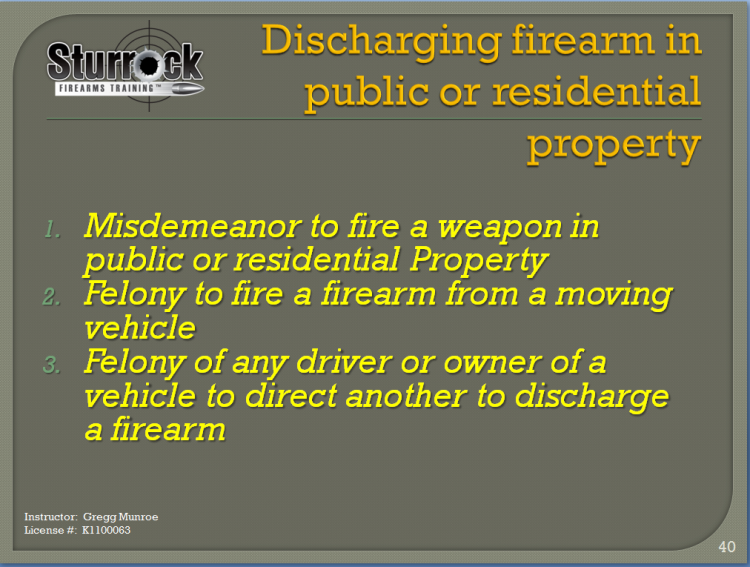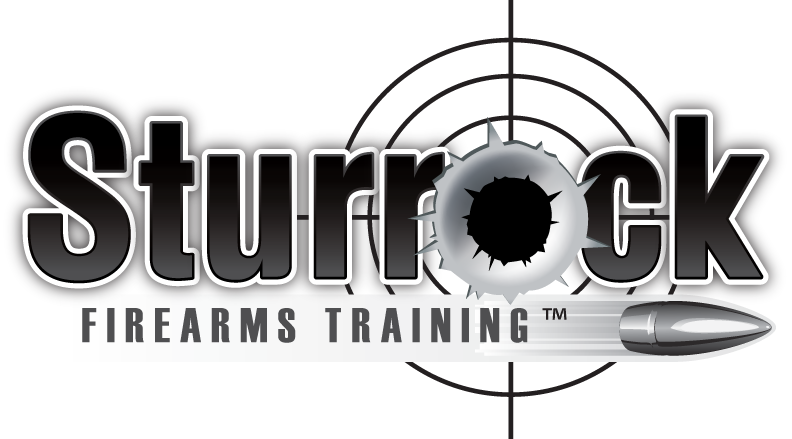PART II Class Instruction
During this block of instruction we will discuss the weapons included in the law. Flordia's CCWP is called a Weapons/Firearms permit so you are allowed to carry more than just a handgun concealed. We will also cover prohibited ammunition, what is allowed and what is not. Carrying prohibitions; just because you can carry a concealed firearm, there are places where you are prohibited from carrying them. We will talk about deadly force, justifiable use of force, the "Home Protection", the "Stand Your Ground Law", the use of deadly force to gain leverage in an argument, verbal threats of force, warning shots, discharging a firearm in public or residential property and using a firearm while under the influence of alcohol or controlled substances. When you are finished in this section you will go to PART III where you will test your knowledge of what we covered in PART II by giving you a series of eight (8) shoot/no shoot scenarios. These scenarios put you in real life situations and test your knowledge of the rules regulations and laws. And, they are fun...
Per Chapter 790.06, "License to carry a concealed weapon or firearm", states that your CCWP authorizes you to carry in a concealed manner a handgun, knife, billie and a few other weapons. Review the above chapter for all weapons. As it states in Part I, you must conceal these weapons at all times. With your license there are no restrictions on the number of weapons/firearms that you can carry as long as they are concealed. Be careful if you plan to carry a concealed knife in other states as their laws might be different. For example, we have a reciprocity agreement with Alabama. However, they will only honor and allow you to carry a concealed firearm. Therefore, you can potentially be arrested for carrying a concealed knife. I know I've said this before, but before carrying any weapons outside of Florida, know the other states laws before you carry there.
Chapter 790.31 deals with prohibited ammunition, in particular, you cannot carry armor piercing or exploding ammunition in your firearm. The slide lists most of the prohibited ammunition per the chapter. To stay out of trouble only buy your ammunition from a reputable store, gun shop or other location that sells ammunition. I would stay away from buying reloads from people you do not know as there is no quality control or quality assurance. Not to mention, in the unlikely event that you do fire your weapon and an investigation ensues, they will seize your gun and inspect your ammunition. If you have illegal ammunition you can be charged with a crime. Therefore, it's best to buy from a reputable location. As far as ammunition and what you should carry in your firearm is concerned, I recommend practicing at the range with ammunition they refer to as full metal jacket or ball ammunition as it's cheaper. I recommend using what they call Hollow Point ammunition when you are carrying. Its more expensive, but it has better stopping power if you need to fire your weapon in a real life situation.
Just because you have a Florida CCWP it does not allow you to carry it anywhere and everywhere. There are a few carry restrictions. The full list can be seen by clicking here and going down to section (12) if you cannot read the slide. Plus, the actual chapter, 790.06(12) provides the full explanations. Please learn these restricted locations as if you are found to be carrying in any of these locations you have committed a crime and probably will loose your license. If you know you're going to one of these locations either leave your gun at home or lock it in your car. Another topic that comes up frequently when discussing places that prohibit carrying firearms are individuals/companies that place signs in their windows or entrances to their business or store that say, "NO FIREARMS ALLOWED". Individual store owners, and in fact, any individual has the right to put up the signs, but you are not legally bound to abide by the signs. The only steadfast restrictions are listed in 790.06(12). With that said, if you do venture into one of these establishments they can ask you to leave. If you do not leave they have every right to call the police. If you still do not leave they can have you
arrested for criminal trespass. When you see such a sign I recommend you honor the store owners/establishments wishes and do not enter. Ultimately, they will not get your business. I would let them know that as a result of the sign that they lost you as a customer. This has a tendency of changing peoples minds when it negatively impacts their business. A quick story. A client of mine walked into his bank one day and saw a "No Firearms" sign. He walked in and said he was going to close all of his accounts. When asked why he said by placing that sign in the window he was not welcome. The sign was removed the following day. So, your voice does make a difference.
Per Chapter 790.251, you have the right to bear arms in your automobile for self protection. Click here for the full Chapter. As seen on the adjacent slide, no public or private employer may violate your Florida constitutional right to possess a concealed firearm in your vehicle. For all practical purposes, in the State of Florida, you will not see a sign in a parking lot of a business or an employer that prohibits employees or customers from possessing a legally owned firearm in their vehicle. This chapter also states that no employer or business establishment can take any action against you for statements you make that you have a firearm locked in your vehicle. For example, you are in a store and meet a friend. You tell the friend that you bought a new gun and it's locked in your car. An employee overhears that you have a gun locked in your car and calls police. The police arrive and find out that your firearm is legally locked in your car. You can take civil action against that store for violating your rights. However, as you can imagine, there are some exceptions to this rule. The state has placed restrictions on some places you cannot have a firearm in your vehicle. These are the exceptions:
Any school property (A bill was passed not long ago that allows college students and faculty to conceal a firearm in their vehicle. They still cannot carry a concealed firearm on campus, but at least now they can have one secured in their vehicle), any correctional institution, any property where a nuclear-powered electricity is generated, property owned or leased by a public or private employer or the landlord of a public or private employer where activities involving national defense, aerospace or homeland security is conducted, where the primary business conducted is the manufacture, use, storage, or transportation of combustible or explosive materials regulated under state and federal laws and any motor vehicle owned, leased or rented by a public or private employer or the landlord of a public or private employer. Bottom line, if the vehicle is registered to you, you and you are over 18 years of age, you can carry a loaded firearm in your vehicle. The next slide provide instruction on how to do this.
PART II
ESTIMATED COMPLETION TIME:
45 MINUTES
Chapter 790.25(5) states that anyone 18 years or older may possess a firearm in their conveyance if they follow two main guidelines. See the full chapter by clicking here. The first requirement is that the firearm is securely encased and the second is that it is not readily accessible. The definitions can be found in Chapter 790.01 paragraphs (16) and (17). Securely encased means, per the state, that it can be loaded, but it must be in a Glove box, whether or not locked; snapped in a holster; in a gun case; whether or not locked; in a zippered gun case; or in a closed box or container which requires a lid or cover to be opened for access. If you are unsure what this means, please get a legal opinion from someone familiar with the statute. Please get additional legal opinion on this if you plan to carry your firearm other than the glove box. I get asked questions as to the container and the type of holster. As I read the wording, a snapped holster means exactly that. A holster with a snap that secures the
I wanted to also include the Federal law for carrying a firearm in your vehicle. Those of you who conduct interstate travel with your firearm you really should go to each states laws on this subject and find out what they are. Some are as liberal as Florida and some are extremely restrictive and if you were caught carrying a firearm in a state such as New York as you would carry it in Florida you would go to jail. But, if you are not in a position to do the appropriate research or for some reason cannot, I recommend once you leave the state of Florida that you know the Federal law and carry your firearm per those Federal regulations. Bottom line, the Federal law states that any person who is legally allowed to own a firearm can transport that firearm from place to place. However, unlike Florida where you can carry a loaded firearm, the Federal law's bottom line is this: It is permissible to travel interstate with your legally owned firearm as long as the firearm is unloaded and in such a place where it is completely inaccessible, preferable locked in the trunk.
handgun. Therefore, a holster without a snap would not be in compliance. As far as a box or container, as I read it any box that holds the gun or any container, even a Tupperware container that has a lid would be in compliance. To comply with the law and to be able to retrieve your firearm as quickly as possible I recommend carrying your firearm in your vehicle in the following manner. Take a fully loaded firearm and place it in a snapped holster and place it in an unlocked glove box. I call this your 3 step rule. Step (1) open the glove box, step (2) take out your firearm and step (3) remove the firearm from the holster. This would be the quickest way to retrieve your firearm in an emergency. If you have your CCWP do you have to comply with the above law? If you have your CCWP then you can keep your firearm concealed on your body when driving in your vehicle. However, if for some reason you take your firearm off, for example if you are uncomfortable wearing it while driving, then yes, you must comply with the current law. Once you take off your firearm and it's no longer concealed on your body, then you must comply with the above law. Just the fact that you have a CCWP does not mean you can carry your firearm openly and not have it securely encased. Therefore, if you are a CCWP holder and do not want to comply with the above law then keep it secured on your person.
The simple definition for this class' purpose is that "Deadly Force" is defined as any force that is likely to cause or could have caused Death or great bodily harm to someone. Press here to see the full definition. If you use deadly force you must be able to articulate why you used deadly force and that explanation must contain verbiage as to why you felt your life or the life of another was at risk. If you shoot someone, there will be an investigation by law enforcement. If the investigation finds that you were justified then you'll be okay from criminal prosecution. However, you will always be subject to other types of complaints such as civil law suites.
We use the term "Justifiable Use of Force" to define when someone is justified in using force, to include deadly force, when confronted with a situation that requires action to stop someone from an illegal act that could cause death or great bodily harm to an innocent person(s). The full Florida State Statute on Justifiable Use of Force can be seen by clicking here.
Florida State Statutes includes wording that states, in part, you are justified in using deadly force to prevent the imminent commission of a forcible felony. How does Florida define a forcible felony? Click here to read the full definition. As you have seen in the definition, there is a full range of crimes for which you are authorized by the state to use deadly force. One thing to keep in mind is that all/most of the crimes have a single common denominator. They all define crimes that are committed against a person(s). So, think of it this way, you can only use deadly force if a person(s) is/are involved.
In most instances you can only use deadly force to protect human life. You cannot use deadly force to protect property unless you are attached to that property in some manner, i.e. a man comes up to you with a gun and wants to steal your wallet. Even though he only wants your wallet, your life is in danger and therefore you can use deadly force to protect yourself and your property/wallet. Conversely, deadly force would be considered excessive if you walk up to someone who is in the act of stealing a purse from an open window of a car and you shoot him.
For the most part, F.S.S 776.013, "Justifiable Use of Force, Home Protection" pertains to protecting yourself in your residence, dwelling or vehicle. For the full Statute please click here. It's worth reading in it's entirety due to it's importance. The state gives people in Florida two very valuable presumptions. The first presumption states, in part, that if someone attempts to gain entry or does gain entry to your residence, dwelling or vehicle etc., you are presumed to be fearful of your life. The second most very important presumption is that the person(s) who unlawfully gain entry or attempt to gain entry into your residence, dwelling or vehicle, is there to commit and act of force or violence. Therefore, when you are in your home, vehicle, friends home, hotel room, tent , etc, (Anywhere you consider a place where you are lodging therein at night), you are able to use deadly force against that person who unlawfully entered your residence, dwelling or vehicle. It does not matter what their intent was or if they intended to do you harm. The state says that you are in fear of your life and that the person(s)
who unlawfully entered your home, residence or vehicle was there to harm you. The state further says that a person who is attacked in his or her dwelling, residence, or vehicle has no duty to retreat and has the right to stand his or her ground and use or threaten to use force, including deadly force if someone breaks into your residence, dwelling or vehicle. Now, lets define what a "DWELLING" is per the state. It means a building or conveyance of any kind, including ANY attached porch, whether the building or conveyance is temporary or permanent, mobile or immobile, which has a roof over it, including a tent and is designed to be occupied by people lodging therein at night. A "RESIDENCE" means a dwelling in which a person resides either temporarily or permanently or is visiting as an invited guest. A "VEHICLE" means a conveyance of any kind, whether or not motorized, which is designed to transport people or property. It is pretty clear that the state of Florida is giving you a lot of latitude in using deadly force under the Home Protection Doctrine.
Now let's discuss the "Stand Your Ground Law". How does this differ from the Home Protection Doctrine? Simple, think of the stand your ground law as everywhere else outside of your dwelling, residence or vehicle. This law is codified in two statutes: Florida State Statute 776.012 and 776.013. Both statutes essentially state that you have no duty to retreat, and you can defend yourself or another from someone committing a forcible felony. We learned what a forcible felony was above. There also is a stipulation there that states you too must be there legally and are not yourself committing a crime. For example, you would not be covered under the following circumstance. You are holding up a convenience store. Just by chance another person plans to stick up the same store and you shoot and kill him. As outlandish as that sounds, the point being made here is that in order for you to use the stand your ground law you must be there legally. What would a legal situation look like. Let's take the convenience story scenario
again. You walk into a convenience store and you see someone pointing a gun at the clerk. You take out your firearm and you shoot the robber. You are covered because you were there legally and were protecting the clerk from death or great bodily harm.
As a general rule, self-defense only justifies the use of force when it is used in response to an immediate threat. The threat can be verbal, as long as it puts the intended victim in an immediate fear of physical harm. Offensive words without an accompanying threat of immediate physical harm, however, do not justify the use of force in self-defense.
Moreover, the use of force in self-defense generally loses justification once the threat has ended. For example, if an aggressor assaults a victim but then ends the assault and indicates that there is no longer any threat of violence, then the threat of danger has ended. Any use of force by the victim against the assailant at that point would be considered retaliatory and not self-defense.
You cannot display, i.e. point your firearm or even show your firearm to someone to gain leverage in an argument. Unless your life or someone else's life is in danger, you cannot display your firearm. If you do, you have committed a felony that is punishable with a mandatory three (3) year jail sentence. Therefore, under no circumstance show or brandish a firearm unless you are legally able to use the firearm. If you do show your firearm you have become the aggressor and subject to criminal prosecution.
Per House Bill 89, known as the "Warning Shot Bill", allows for a defensive display of a firearm, including the discharge of a firearm for the purpose of a warning shot, and it does not constitute the use of deadly force. Providing immunity from prosecution for the persons action in defense of life, home and property from a violent attack or the threat of a violent attack though displays of force. Prior to this bill, warning shot were an arrestable offense. As I recall, now don't hold me to this, but a woman was arrested for firing a warning shot at her attacker and was arrested. The woman was eventually acquitted, and this bill was written. What is a warning shot? A warning shot means an individual fires his/her weapon and intentionally misses the intended target to get their attention and to stop them from committing an act that caused them to take their gun out in the first place, i.e. stop the subject from robbing someone. However, a warning shot in itself can be dangerous to an innocent bystander. The theory is, whatever goes up must come down and could strike someone else. Therefore,
In most instances, unless you reside in a location where you have a lot of acreage, then you will not be allowed to discharge your firearm in the city limits of any city or town. Click here to see the full statute (790.15). It is a crime to shoot within the city limits in most instances and a crime to shoot from a moving car.
As you can imagine, nothing good can happen to anyone who uses his/her firearm while intoxicated. However, you might be surprised of one of the exclusions. Click here for the entire statute. Chapter 790.151. It is unlawful for anyone to discharge (fire) or have a firearm readily accessible when intoxicated. The term "Readily Accessible" means you have a loaded gun in your hand. Most might think readily accessible will also mean that you are carrying your firearm in a holster on your body. However, it does not say that. Therefore, to get charged with this crime, it is my opinion that you must either fire the firearm or have a loaded gun in your hand when intoxicated. If you have questions on this matter I recommend speaking to an attorney. It's obviously best not to drink at all when you plan to carry your firearm on you. In fact, it's not very responsible of you to drink and then carry a loaded firearm on you. Now to the exclusion. The chapter says, "This section does not apply to persons exercising lawful self-defense or defense of one’s property."
What does that mean to you? It means that even if intoxicated, you are authorized to protect yourself from being a victim of a "Forcible Felony" . The mere fact that you are intoxicated does not mean you have to be a victim of a crime such as Homicide, Rape, Robbery, etc.
you have three options when you take out your firearm to stop someone from committing a forcible felony. The first is to point the firearm at the suspect and give them verbal commands to stop, fire a warning shot or finally shoot your firearm at the person to stop them from committing the forcible felony. Bottom line, I do not recommend warning shots. In all honesty, the best course of action, even though you are not required to do so, is to flee the area and call police and let them handle the situation. But, if you must protect yourself, do whatever is necessary.
NRA Instructor: Gregg Munroe
License #: 210405662
NRA Instructor: Gregg Munroe
License #: 210405662
NRA Instructor: Gregg Munroe
License #: 210405662
NRA Instructor: Gregg Munroe
License #: 210405662
NRA Instructor: Gregg Munroe
License #: 210405662
NRA Instructor: Gregg Munroe
License #: 210405662
NRA Instructor: Gregg Munroe
License #: 210405662
NRA Instructor: Gregg Munroe
License #: 210405662
NRA Instructor: Gregg Munroe
License #: 210405662
NRA Instructor: Gregg Munroe
License #: 210405662
NRA Instructor: Gregg Munroe
License #: 210405662
NRA Instructor: Gregg Munroe
License #: 210405662
Click this button to be taken to Part III instruction.
Click this button to be taken back to Part I instruction.


